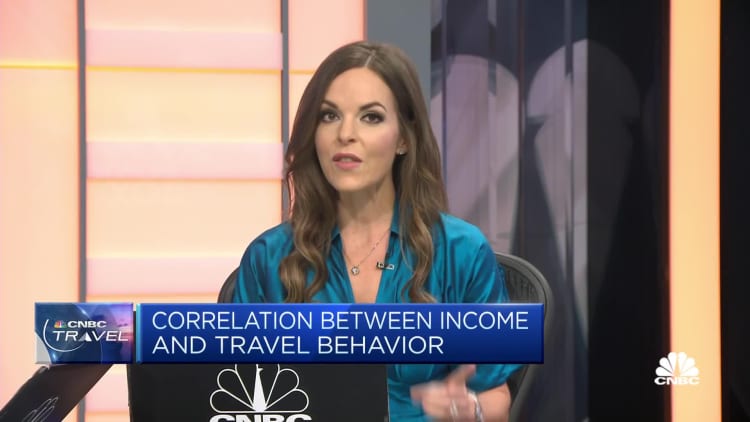Rome ranked second on a recent list of best travel destinations for a digital detox.
Piola666 | E+ | Getty Images
Despite inflation, Gen Z and millennials are determined to travel this summer, even if it means spending a bit more.
While almost two-thirds, or 73%, of people are willing to pay extra fees for travel insurance or refundable booking options for their trips, Gen Zers and millennials are far more willing — at 87% and 83%, respectively — to pay extra for travel protections compared with other generations, according to a report by Bank of America. The bank surveyed 2,003 consumers in June.
“I think a lot of it goes to the lifestyle of the different generations and where they are traveling,” said Mary Hines Droesch, head of consumer and small business products at Bank of America.
While Bank of America posed the question differently in a prior, similar report, the latest findings seem to represent an increase. When the bank surveyed 2,020 consumers about their savings and spending attitudes and behaviors in March 2022, 54% of those who planned to travel said they would purchase trip protection, including 73% of Gen Z and 65% of millennial travelers.
More from Personal Finance:
College is more expensive than ever
What’s at stake for workers amid a ‘summer of strikes’
‘Soft landing, no recession,’ Bank of America predicts
Since younger generations may face tighter restrictions, from available free time to finances, they avoid risk where and when they can to ensure their travel plans go smoothly.
Why younger travelers spend more insuring trips
Many baby boomers are retired and enjoy a degree of flexibility when it comes to travel. For instance, they are the most likely cohort to travel on nonpeak days (60%) or to drive instead of fly (54%) to their destination, according to the Bank of America report. That’s less true for Gen Z, said Droesch.
“When [Gen Z] plan a trip, they’re really limited to the time that they’ve taken off from work, and especially now that there’s such a push for people to return to the office,” she said.

By opting to buy travel insurance, younger people’s plans are more protected, added Droesch. Boomers “have other options [in case] things go awry, because they don’t have the constraints of having to be at the office, at the very least, three days a week,” she said.
Roughly 20%, or 1 in 5, of customers on Hopper who generally tend to be Gen Z and millennial users, are adding the travel app’s flight disruption guarantee product as a way to protect their trips, said Hayley Berg, an economist at Hopper.
“It’s hugely popular with travelers, especially those who are worried about all the disruptions that are in the news right now,” said Berg.
Pandemic leaves travel jitters in wake
Many travel plans were canceled during the Covid-19 pandemic and many disappointed buyers got no refunds, even if they had travel insurance because unforeseen events such as the Covid-19 lockdown weren’t covered. The experience left a “lasting impression on younger generations,” said Droesch.
With other countries now reopen for tourism due to relaxed or completely eliminated Covid restrictions, younger U.S. travelers don’t want to miss out on new experiences. However, given those lockdown memories and their limited disposable income, they’re also insuring trips so that if something unexpected happens, they can travel at a later date, said Droesch.
The travel sector is also still experiencing higher service disruption rates compared with pre-pandemic times, according to Berg at Hopper.
“Travelers are a lot more worried about being disrupted than they probably were four years ago,” she said. Additionally, given a stubborn — albeit falling — inflation rate, “a lot of families are tightening their belt,” Berg added.
These two generations are no longer simply “young ones,” so to speak, said Berg. Millennials are entering their 40s, and much of Gen Z have graduated college and are starting their careers.
“They’re building economic power and have entered adulthood,” she added. “I do think the trends that we see in this demographic are the trends I expect to see for the next 10 to 20 years.”
To that point, increased interest in travel protection products is not a fleeting phenomenon. Users who applied travel protection products on Hopper are two to four times more likely to purchase the product for future trips, adding up about 10% or $40 more per booking, said Berg.
“It comes at a cost, but we’re seeing the willingness, and the repetitive purchases are really there,” she added.
While travel insurance sounds like a good idea, travelers should be aware of the different types of travel insurance that exist and be sure of which type they buy. For instance, you can cancel a flight for any reason and get a full refund through Cancel for Any Reason, or CFAR, plans. However, such coverage can add up to 50% or more on top of actual costs.
Traveling for less can mean risking less
Insurance or no insurance, opting to travel when others are staying home can mean risking less hard-earned money. Traveling during a destination’s “shoulder seasons,” or the transition period between times most popular with travelers — such as spring and fall, which bookend the summer high season, in Europe — is favorable because that’s when the best deals are usually available, said Berg.
“January, September and October are the cheapest months of the year to travel pretty much anywhere in the world and to stay in hotels because it’s back to school, [and] most of Europe has gone back to work after their summer holidays in August,” she said.
Considering off-peak days for travel and hotel stays can help “chip away the cost of the trip.”

